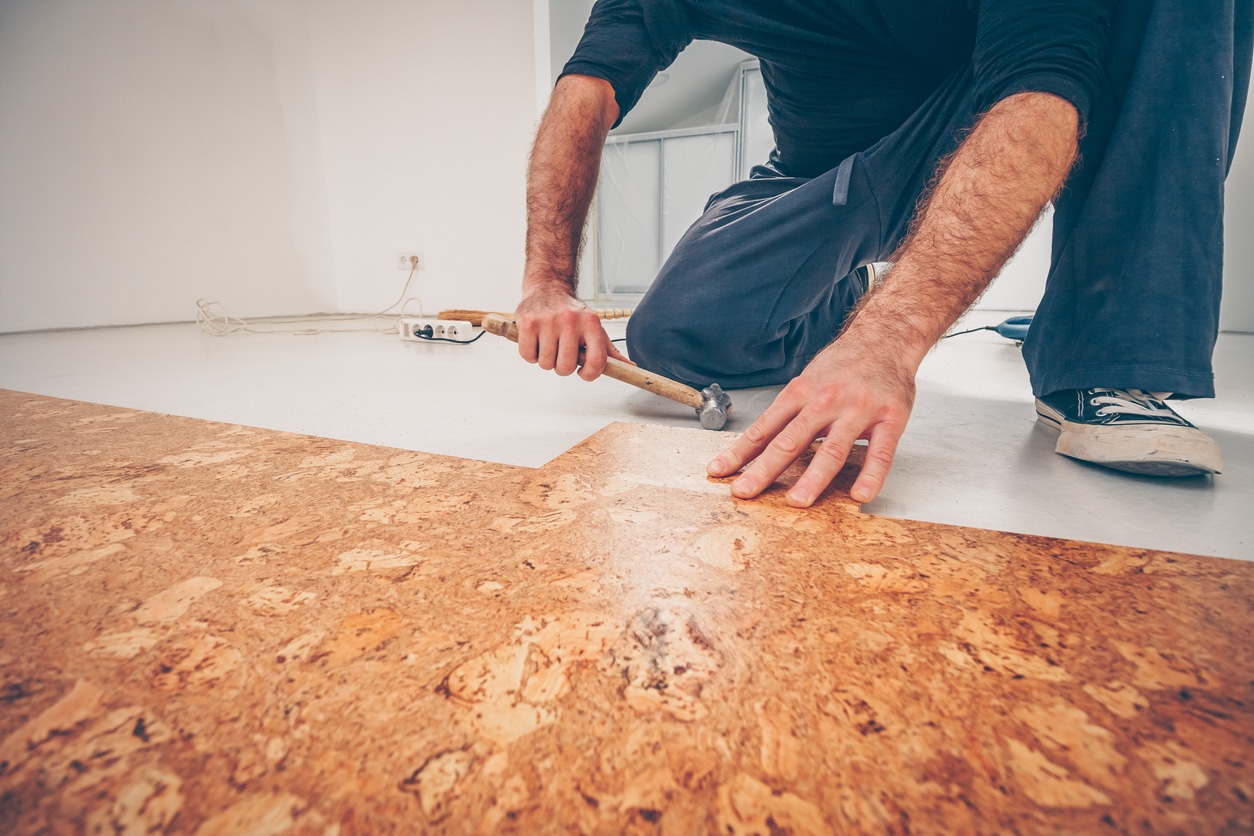Cork Stripped Flooring: Better than Hardwoods?

If you’re looking for an earth-friendly material to replace or refinish your floors, whether in the interest of sustainability or to achieve a natural aesthetic or both, cork stripped flooring might just be the superior choice – even over the ever popular and time-tested hardwoods. There are several options in this category, but cork and hardwoods take the lead as both the most environmentally friendly and the most appealing to homeowners and homebuyers alike.
Cork stripped flooring is made from the bark of the cork oak tree. Beginning when the tree is 25 years old, the cork is carefully harvested by hand with a small hatchet without damaging or hurting the tree. The cork is first punched into wine and champagne bottle stoppers, then the leftover material is ground up and mixed with binders, after which it is compressed and cut into large flooring sheets or tiles. The two main types of cork flooring products are cork tiles and engineered cork planks.
Hardwoods may be the most prevalent type of sustainable flooring, but homeowners are beginning to turn to cork for its many benefits which may outweigh classic hardwoods after taking a variety of factors into account. Let’s consider several of the advantages of each and how the two compare as a desirable and sustainable home flooring choice.
Durability
When you’re making the significant investment to upgrade your floors, it is worthwhile to consider how your material of choice will withstand long term wear and tear. Cork stripped flooring is able to withstand heavy foot traffic and resists scratching and denting, making it a great option for households with pets or children. It is the porous quality of cork that contributes to its durability and allows it to bounce back when impacted by furniture and feet. This also makes for a more comfortable and cushioned feel underfoot, which is why it is a popular flooring option for yoga and dance studios and is perfect for a home gym. Finally, when properly maintained, cork flooring can last 40 years or longer.
Hardwood floors are also durable and long-lasting, but they are more susceptible to scratches and dents – especially from heeled shoes and furniture – and require extensive refinishing to repair. They need to be protected from impact and are not as accommodating for physical activity.
Insulation
The aforementioned “springy” quality of cork is due to its honeycomb structure of individual air-filled cells with flexible walls, and it is these pockets of air that also make it an excellent insulator. Cork was primarily used as an insulation material until the famous architect Frank Lloyd Wright popularized its use as a flooring option. It feels warmer underfoot and contributes to keeping spaces cooler in the summer and warmer in the winter, which not only keeps temperatures more comfortable, but saves energy costs as well. Cork is also excellent for noise insulation, making it a great alternative to carpet for shared spaces and areas that transmit noise, like the second floor of a home or a children’s playroom.
Hardwood floors not only lack insulating abilities, but they can actually contribute to indoor heat loss. With their hard smooth surface, they transmit rather than absorb sound, and require noise-reducing furniture and wall coverings to be added to a room to soften its acoustics.
Cleanliness
The waxy substance that covers its cell walls makes cork naturally antimicrobial, giving cork flooring the added benefit of resistance to insects, mold, and mildew, protecting both the floor and indoor air quality at the same time. It a good choice for allergy sufferers for another reason too: it can easily be cleaned by simply sweeping with a soft bristled brush.
Hardwood floors are also relatively easy to clean, and with protective varnishes and regular care they are unlikely to develop mold and mildew but are more susceptible to these allergens than cork.
Sustainability
Cork is a natural raw material that can be harvested from the same cork oak tree every 9 years without harming it, and the trees live for up to 250 years. Since the bark regenerates after harvesting, cork is a purely renewable resource.
According to a survey by the National Association of REALTORS®, over 50% of real estate agents report that buyers are interested in sustainability. As a flooring product, cork is incredibly sustainable. Cork floors are the end result of utilizing the leftover cork from manufacturing cork bottle stoppers as useful flooring material, for a waste-free production cycle. At the end of its life, cork flooring can be recycled and is biodegradable.
Hardwood flooring comes from trees that take much longer to grow, and harvesting them for raw materials can contribute to deforestation. If harmful chemicals or adhesives are used, the installation process of hardwood floors can also negatively impact indoor air quality.
A Great Alternative to Hardwoods
Cork is a comfortable, renewable and versatile option that is worthwhile to consider for your next flooring project. Besides all of the qualities mentioned above, cork stripped flooring is water- and fire-resistant and available in a variety of hues, patterns and wood-like finishes. Whether you are looking to upgrade your current floors for your own enjoyment or preparing to sell your home, we are knowledgeable on housing market trends and would love to share our expertise with you. Give our top 1% seller’s agents a call at 503-714-1111 today!


